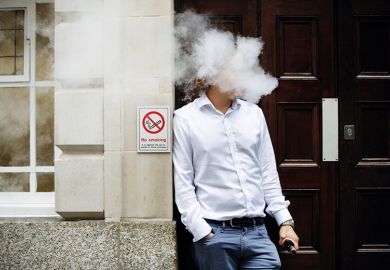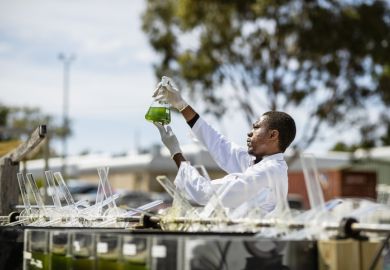Researchers should be forced to list the financial support they receive directly or indirectly from tobacco companies on their academic profiles to tackle concerns that scholars’ links to industry are “not always immediately apparent”, a study recommends.
In a paper published in Tobacco Control, researchers from the University of Bath’s Tobacco Control Group call for a new system of financial disclosure for scientists who accept funding from third-party organisations funded by tobacco companies – in particular, the Foundation for a Smoke-Free World (FSFW), established by the Swiss-US tobacco giant Philip Morris International in 2017 with the stated aim of “eliminating smoking worldwide” within a generation.
But some scientists have questioned the foundation’s ambition in light of what the paper calls “the industry’s long history of science manipulation”, adding that “increased transparency” was needed because researchers funded by the foundation do not always make clear the industry origins of their support.
“Some researchers at FSFW-funded organisations are failing to be transparent about their industry links, when authoring or peer-reviewing articles, and editing journals or special issues,” claims the study by Tess Legg, Michel Legendre and Anna Gilmore, which says the foundation and grantees had “resorted to repeated obfuscation when publishing their science”.
The paper says that two articles authored or co-authored by FSFW grantees, which appeared last year in the Emerald-published journal Drug and Alcohol Today, failed to mention the millions of dollars received by their institutions from the foundation.
Only one of nine papers, all of which included authors funded by the foundation, explicitly identified Philip Morris as the ultimate source of funding, it adds, claiming that the foundation was “seemingly looking to publish in journals with less stringent or less stringently enforced [conflict of interest] policies”.
To combat such practices, journals should standardise their practices on how conflicts of interest should be disclosed to ensure that all FSFW funding received by a researcher or their research group is declared, Ms Legg told Times Higher Education.
“There are almost as many different guidelines as there are journals, so there is no consistency about how people disclose conflicts of interest, and that needs tackling across publishing,” said Ms Legg, who noted that some journals did not require editors or reviewers to disclose their links to industry-funded bodies.
Other measures beyond publishing were also needed, added Ms Legg, whose paper backed a recent proposal for researchers to list their external funding sources on their ORCID academic profile.
“Every researcher would need to input all their financial links – whether that is funding for going to conferences or grants their research group has received from the tobacco industry,” she explained, saying this would help journal editors to identify and exclude research funded by the tobacco industry and its affiliates, a practice to which many titles already adhere.
Professor Gilmore, professor of public health at Bath, told THE that their investigations had shown that the tobacco industry was “once again using science as a political weapon”.
“The industry is using the foundation and its published studies for PR purposes while the science they do not want you to see almost certainly remains hidden, just like in the past,” said Professor Gilmore.
Calling for a “new funding model” for the Philip Morris-funded foundation, she added that “the tobacco industry should pay for research, but it cannot be trusted to operationalise that”.
“Instead, science in this area should be funded through legally mandated payments from the tobacco industry which are then independently administered,” said Professor Gilmore.
However, some researchers named in the Tobacco Control article took issue with study, saying its call for journals to reject all research that received industry-related funding was misguided.
Axel Klein, editor-in-chief of Drug and Alcohol Today and senior research fellow at the Global Drug Policy Observatory at Swansea University, told THE that the paper’s “attempt to bully the journal into refusing to accept such papers is tantamount to censorship and completely ignores the fact that the foundation is recognised as an independent non-profit under US law”.
In a statement, the foundation said it “supports transparency in research” and “adhere[d] to the highest ethical and scientific standards, including disclosing our funding source in all journal submissions by our staff and grantees”.
“The foundation requires that its grantees make their research publicly available, including their raw data for re-analysis,” it said.
It also criticised the “short-sighted policies of some publications…[that meant] research funded by our grantees and scientists from the tobacco and e-cigarette industries are rejected without review”, which was “counter to basic principles of academic freedom and Unesco’s open science recommendations”.
This “boycotting” of research into harm reduction technologies “undermines the ability of policymakers to make truly, fully informed decisions”, it said.
“Our mission is to end smoking in this generation. All of our actions are to that end. To suggest otherwise is not just wrong but the antithesis to what we should all be seeking, which is to accelerate the decline in tobacco-related deaths,” the foundation said.
Register to continue
Why register?
- Registration is free and only takes a moment
- Once registered, you can read 3 articles a month
- Sign up for our newsletter
Subscribe
Or subscribe for unlimited access to:
- Unlimited access to news, views, insights & reviews
- Digital editions
- Digital access to THE’s university and college rankings analysis
Already registered or a current subscriber?








